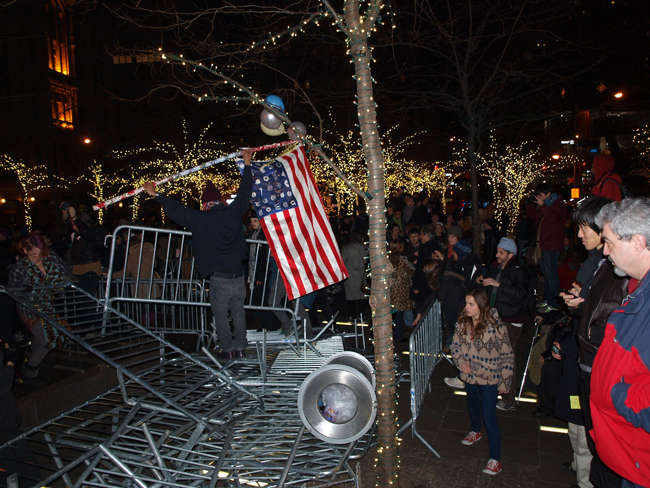
BY ZACH WILLIAMS | Ongoing tensions within the Occupy Wall Street movement in recent days contrasted with collective actions aimed at asserting authority over public spaces in Lower Manhattan.
Hundreds of activists gathered at Zuccotti Park for a New Year’s Eve celebration that culminated in clashes with police while activists dismantled the barriers that surrounded the park. Dozens of people were arrested and the park was indefinitely closed. But outside the public eye, occupiers are divided over how to best organize their movement while maintaining its egalitarian nature.
The movement has largely existed through the activities of its numerous working groups since a Nov. 15 NYPD raid ended the nearly two month-long encampment in the park, which remains the symbolic center of the global movement for social and economic justice. While some occupiers have said since then that the movement should find alternatives to physical occupation, the notion that public space should be made available for the movement’s purposes remains strong among others.
A recent attempt by activists to set up a new encampment in a vacant lot owned by Trinity Church led to multiple arrests. Occupiers said they expected a police raid at a general assembly meeting scheduled for Tuesday night at 100 William Street.
But the New Year’s Eve demonstration did not concretely address the need to re-establish an encampment, according to Courtney Harrop, 35, an occupier from Vancouver, Canada who was present.
“The vibe was great. People were happy. As far as the barricades being taken down, I thought that was fantastic and very symbolic,” said Harrop. “The only thing that I wasn’t super-excited about was the final march, because when the march left the park that’s when [NYPD] moved into the park and had us all removed.”
Some occupiers believe the lack of a central location where all factions of the movement can meet weakens the movement by making it difficult to ascertain how to best participate.
Alex Nicoletti, 54, a wilderness survival instructor from Vermont, said the leaderless nature of Occupy stood in sharp contrast to his previous experiences in activism. A veteran of Students For a Democratic Society in the 1960s, Nicoletti did not know where to go when he arrived in New York City two weeks ago.
“It was difficult to tap in,” said Nicoletti. “There wasn’t any orientation which is key to a lot of organizations. You usually will have a point person to give you an idea about what is going on.”
Recent meetings of the Spokes Council underscored opposing visions of how the movement should move forward and rectify organizational challenges. Opposing opinions on how to maintain discipline within a leaderless movement governed through consensus has hindered efforts to facilitate greater efficiency among working groups.
Several occupiers gained the ire of their peers for speaking out of process and using profane language at recent meetings of the council. Nan Terrie, who has represented the Strong Women Rules Working Group, said she was one of five people barred from attending a Dec. 30 meeting and subsequently called NYPD alleging that she was physically prevented from entering West Park Presbyterian Church where the meeting took place.
An NYPD spokesperson did not respond by press time to a request for comment.
Organizers discussed controversy surrounding the incident at a meeting held Monday night at the church. Many in attendance defended the authority of the council to maintain discipline among participants by removing those who interrupt others and use language that may offend the sensibilities of their host.
Calvin Roy, a real-estate agent who was present at both meetings, said the controversy was not simply about addressing disruptions or the use of profanity in a church.
“The fact is that if you are to [act] in a procedural manner you have to have some type of order,” Roy said.
Jason Harris, an occupier who acts as a liaison between the movement and the church, said Monday that, while the incident “was ugly,” he had to keep Terrie and others out of the Dec. 30 meeting for the ultimate benefit of the movement.
“I didn’t want to jeopardize this one space that was very difficult to find; I didn’t want to jeopardize [housing for] the hundred people moving in and I didn’t want to jeopardize our name,” Harris said during the discussion Monday night.
Fellow occupiers know Terrie for her constant disruptions and assertions that the council marginalizes those from minority communities. Terrie defended herself Monday by saying that the council is un-democratic and that those who prevented her from entering the church on Dec. 30 should “burn in hell”. She added that the movement has become dominated by working groups who do not necessarily represent all occupiers.
“I know that other people here do not like me because I stand for the poor, the homeless, the lesbians, the gays, those that are marginalized and cannot be here,” Terrie said. “This movement has honestly been hijacked.”


































